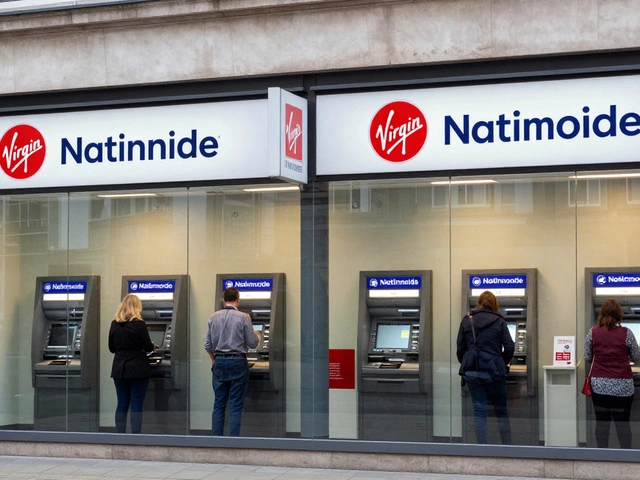Every morning, millions of people in the UK open the Daily Express to find out what’s happening - not just in Westminster, but in their towns, hospitals, schools, and backyards. It’s not just another newspaper. For many, it’s the first thing they read with their coffee, the one that tells them whether their pension is safe, if the NHS is under more strain, or why their utility bill just jumped again. The Daily Express UK news doesn’t just report events. It connects them to real life.
What’s actually in today’s Daily Express?
If you’ve ever picked up a copy - or scrolled through their website - you’ve seen the mix. Big headlines about the Prime Minister’s latest speech sit right beside a story about a local shop owner in Barnsley who’s been fighting to keep his bakery open after a flood. There’s politics, sure. But there’s also the human side: a veteran getting his long-overdue medal, a school in Liverpool that banned homework and saw grades improve, or the surprising rise in community food banks in rural Wales.
The Daily Express doesn’t pretend to be neutral. It has a clear voice - often skeptical of bureaucracy, supportive of working families, and deeply focused on cost-of-living pressures. That’s why readers trust it. They know what they’re getting: straight talk, not spin. When the government announced a new energy support scheme last month, the Express didn’t just reprint the press release. They sent reporters to three households in Newcastle, Sheffield, and Plymouth to show exactly how much money people would actually get - and whether it covered their heating bills. The result? A front-page story titled “£150 Doesn’t Cover a Month” - backed by real bills, real numbers, and real tears.
Who reads the Daily Express, and why?
It’s not just older readers, though they make up a big chunk. A 2024 YouGov survey found that 42% of Daily Express readers are over 65, but 28% are between 35 and 54 - people raising kids, paying mortgages, and worrying about their parents’ care. These aren’t people who read the Financial Times for market trends. They read the Express because it tells them what they need to know to get through the week.
They care about the state pension increase. They want to know if their local hospital still has ambulances on standby. They check the Express to see if their benefits will change. And they pay attention when the paper highlights a new rule - like the one last April that forced energy companies to notify customers 30 days before a price hike. The Express didn’t just report it. They made a simple checklist: “What to Do If Your Bill Jumps” - with steps, phone numbers, and links to free advice services.
The politics - and the people behind it
The Daily Express has been around since 1900. It backed Churchill in the war, campaigned for Brexit, and has consistently pushed for tighter immigration controls. But its real power isn’t in its editorial stance. It’s in its ability to turn policy into personal impact.
Take the recent announcement about the state pension rising by 4.1% in April 2026. The government called it a “fair increase.” The Daily Express asked: What does that mean for someone living on £10,000 a year? They ran the numbers. A £10,000 pension gets £410 more. But heating costs rose £600. Food prices jumped £280. So the real gain? £130. And that’s before prescription charges and council tax. That’s the kind of breakdown readers remember. That’s why they keep coming back.
The paper’s political coverage isn’t about party lines. It’s about outcomes. If a policy helps a grandmother in Hull pay her rent, it gets coverage. If it helps a CEO in London avoid a tax hike, it gets skepticism.

How the Daily Express handles breaking news
When a major event hits - like the recent rail strike that paralyzed the Southeast - the Express doesn’t wait for official statements. They have reporters on the ground. Within an hour of the first train cancellation, they posted a live map showing which lines were running, which stations had no staff, and where free buses were being arranged. They didn’t just say “services disrupted.” They showed you exactly where to go, what to bring, and who to call.
And when the NHS announced a new waiting list target, the Express didn’t just quote the Health Secretary. They tracked 12 patients across England who had been waiting over 18 months for hip surgery. One was a former teacher in Nottingham who couldn’t walk without pain for 22 months. Another was a single dad in Birmingham who missed his daughter’s school play because he was in the hospital waiting room. Those stories weren’t filler. They were the core of the article.
What the Daily Express doesn’t cover - and why that matters
It doesn’t chase celebrity gossip. You won’t find tabloid-style scandals about actors or influencers. It rarely covers international conflicts unless they directly affect UK families - like when a UK citizen is detained abroad, or when a war drives up fuel prices. That’s not a weakness. It’s a focus.
It also doesn’t overhype minor events. A 1% drop in retail sales? Not front page. A 15% spike in food bank use in one region? That’s front page. The Express knows its readers don’t care about stock market fluctuations unless they affect their pensions. They care about whether their child’s school still has a lunch program. That’s the difference.
How to get the Daily Express today
You can buy the print edition at any newsagent in the UK - it’s still one of the most widely sold papers outside London. But most people now read it online. The website updates every 15 minutes during major events. The app sends push alerts for breaking news - like when a new law is passed or a major strike is called. You can also sign up for their free morning email, which delivers the top five stories by 7 a.m. - no fluff, no ads, just what matters.
And if you’re not sure where to start? Look for the “What You Need to Know” box at the top of each major story. It’s usually just three bullet points. That’s the Daily Express in a nutshell: clear, direct, and made for people who don’t have time to read between the lines.
Is the Daily Express still relevant in 2025?
Some say newspapers are dead. But the Daily Express has 2.3 million readers every day - more than The Guardian and The Independent combined. Why? Because it hasn’t tried to be everything to everyone. It’s stayed true to its core: helping ordinary people understand how decisions made in London affect their lives.
It’s not perfect. It’s been criticized for being too hardline on immigration or too optimistic about Brexit outcomes. But it’s never been out of touch. When the cost of living crisis hit hardest in 2023, the Express didn’t just report it. They launched a campaign called “Helping Hands” - connecting readers with local charities, food banks, and free financial advice services. Over 87,000 people used the guide. That’s not journalism. That’s community action.
The Daily Express doesn’t try to win awards. It tries to win trust. And in a world full of noise, that’s the rarest thing of all.
Is the Daily Express a reliable source for UK news?
Yes, for practical, everyday news that affects households, pensions, healthcare, and local services. The Daily Express has a strong track record of verifying facts before publishing - especially on issues like benefits, energy bills, and NHS wait times. While its editorial stance is clearly conservative, its reporting on concrete impacts - like how a policy change affects real people - is well-sourced and often backed by official data or on-the-ground reporting. It’s not a source for international analysis or academic debate, but for daily life in the UK, it’s one of the most trusted.
How often does the Daily Express update its website?
The Daily Express website updates every 15 minutes during breaking news events - like strikes, government announcements, or major accidents. Outside of breaking news, new stories are posted every 30 to 60 minutes throughout the day. The morning email newsletter, sent at 7 a.m., highlights the top five stories from the previous 24 hours. The app also allows you to turn on alerts for specific topics like pensions, health, or transport.
Can I read the Daily Express for free online?
Yes. You can read up to five free articles per month on the Daily Express website without signing up. After that, you’ll need to create a free account to keep reading. The free account gives you access to all articles, including exclusive content like the daily “What You Need to Know” summaries and the “Helping Hands” directory. There’s no paywall for breaking news alerts or the morning email. The print edition costs £1.50 at newsagents, or £4.50 for a weekly subscription delivered to your door.
Does the Daily Express cover regional news?
Absolutely. While national stories dominate the front page, the Daily Express dedicates a full section each day to regional updates - broken down by England, Scotland, Wales, and Northern Ireland. They have dedicated reporters in over 30 towns and cities. You’ll find stories about school closures in Cornwall, hospital delays in Belfast, or factory closures in the Midlands. The regional pages are updated daily and often feature interviews with local council members, teachers, and community leaders - not just press releases.
How does the Daily Express compare to the Daily Mail or The Sun?
The Daily Express is more focused on policy impact than celebrity or sensationalism. Unlike The Sun, which often leads with headlines about celebrities or sports scandals, the Express sticks to issues that affect daily life: pensions, benefits, energy prices, and healthcare. Compared to the Daily Mail, the Express is less opinion-driven on social issues and more data-driven on economic ones. The Mail might ask, “Is immigration destroying our towns?” The Express asks, “How many families in your area are now using food banks?” One is about emotion. The other is about evidence.
What’s the best way to get the Daily Express if I live outside the UK?
If you’re outside the UK, your best option is the website or app. The print edition isn’t widely available overseas, though some international newsagents in major cities like New York, Sydney, or Dubai may stock it. The website works globally, and the morning email newsletter is sent to over 800,000 subscribers worldwide. You can also subscribe to their digital edition, which mirrors the print layout and includes exclusive online-only content. There’s no regional restriction - anyone can sign up.



